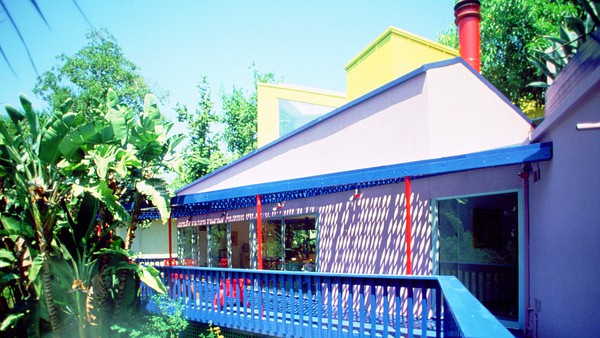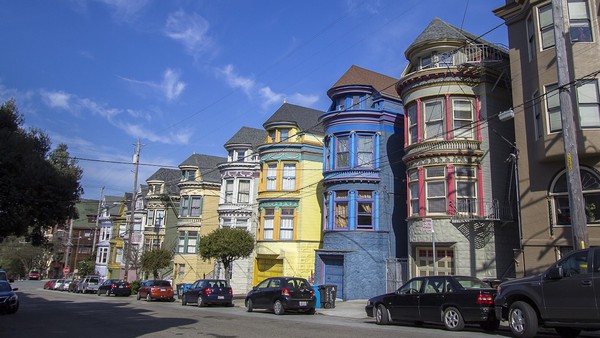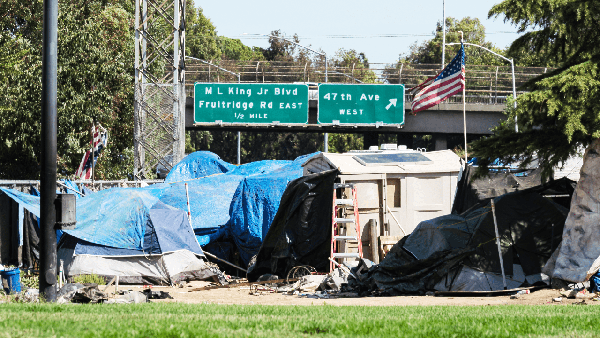A homeless camp along Interstate 80 in Sacramento.
The radical yet eminently responsible notion that housing should be legally recognized as a human right has only recently made it into the news. I first heard about it in the summer of 2019. I was visiting Sacramento Mayor Darrell Steinberg in his office, interviewing him for a story on a different topic, when he told me about the idea. I had asked him offhandedly about the state’s fledgling Commission on Homelessness and Supportive Housing, which Gov. Gavin Newsom had appointed Steinberg—a former president pro tem of the California Senate—to lead. The mayor chose to respond to my question by talking about the human-rights idea, which was frankly more interesting.
Steinberg has twice since introduced measures declaring that the City of Sacramento would be obliged to recognize housing as a human right. These represented the first such moves in the country. In each case, the mayor paired this legal recognition with a requirement that anyone living on the street accept housing if it is offered. (That element of the plan, another first, received much more attention—that is a topic for another day.)
Meanwhile, the idea of recognizing housing as a human right caught on elsewhere in the state. In two subsequent sessions of the California Legislature, there were two such proposals. And in the current session, Assembly Member Matt Haney of San Francisco has introduced a bill that would add an amendment to the California Constitution declaring that the state “recognizes the fundamental human right to adequate housing for everyone in California.” That would be, as Joe Biden might say, a BFD.
The Perpetual Housing ‘Crisis’
I’ve been writing and assigning stories about California’s housing “crisis” for decades. I think this is the first time I’m using that word accurately.
According to the relevant definition in Webster’s, a crisis is “an unstable or crucial time or state of affairs in which a decisive change is impending.” When I've covered the issue previously—dating back to 1997 at newspapers in Santa Cruz, San Jose, Monterey and Sacramento—there was no impending decisive change. Now there is.
In addition to the possibility that the state’s constitution will be amended to fix California's most treacherous problem, lawmakers in Sacramento have made some bold moves that are likely to have an impact. As the LA Times reported when the laws now being considered were introduced, they were meant to “increase production of affordable homes and strengthen tenant protections against evictions and surging rents.” As of this writing, most of them have a strong chance of passage.
Zoning to Fix a Perpetual Crisis
Again: It is not accurate to call California’s housing situation a “crisis” because that word denotes a “crucial time.” This problem is not bounded by years or even decades. It has been painfully difficult for a vast number of people to find adequate affordable housing here since the 1970s. Why is that the case? In a word: Zoning.
From Jon Vankin’s Explainer: “According to a study conducted by the New York Times in 2019, 75 percent of land in many American cities is zoned 'single family,' meaning that building anything other than one structure occupied by one family is outlawed. In San Jose, the study found 94 percent of the city’s land carries single-family zoning.” That is: Zoned exclusively for the most-expensive type of homes.
San Jose may be the worst California city when it comes to zoning for affordability, but the rest of the state is bad. Here’s how we got to this sorry state of affairs. (And yes: Racism is a big part of the problem.)
How Zoning Laws Shape California and Society

Zoning laws determine what can be built and where. These laws have shaped California, but are they really just tools for social engineering? The history of zoning is closely tied to racial segregation, as well as the state's shortage of housing.
Voters May Make Housing a Human Right in CA

More than 170,000 people are homeless in California. Some Democrats want to make the state the nation’s first to declare housing a human right with a state constitutional amendment, but opponents worry it would be costly.
Legislators threatened to reject Newsom’s infrastructure package if he won’t remove the Delta water tunnel. The issue could be ammunition as the budget deadline looms.
(06/20/2023) CalMatters
As thousands of scorned A’s fans lament what appears to be the imminent end of the team’s playing days in Oakland, the organization's many past dalliances with relocation have come under a renewed spotlight.
(06/17/2023) San Jose Spotlight
Mountain View-based mental health services nonprofit CHAC announced that its clinic services will be going on hiatus beginning in August due to a currently insurmountable budget deficit.
(06/16/2023) Mountain View Voice
A San Jose developer’s plan to build up to 850 homes and a large commercial space near Berryessa BART received the green light from the San Jose City Council, but not before a debate about whether the city should be stricter with density and affordable housing requirements when considering new development proposals.
(06/15/2023) San Jose Spotlight
The Fair Political Practices Commission was sympathetic toward Palo Alto Councilwoman Julie Lythcott-Haims, who is trying to exempt herself from a state law that restricts public officials from getting paid for speeches.
(06/15/2023) Daily Post
The Mountain View City Council unanimously approved 7,000 new homes, 3 million square feet of office space and more than 26 acres of parks and open space that will be built out over the next 30 years in the North Bayshore area.
(06/14/2023) Mountain View Voice
A state law that bans cities from imposing parking requirements on new commercial and residential development could spur growth in Palo Alto's California Avenue and University Avenue areas.
(06/14/2023) Palo Alto Online
Latinos in Silicon Valley experience quality-of-life challenges in the wake of the pandemic, including education gaps, worsening housing conditions and health disparities, according to a new report. The Hispanic Foundation of Silicon Valley’s 2023 Latino Report Card.
(06/13/2023) San Jose Spotlight











